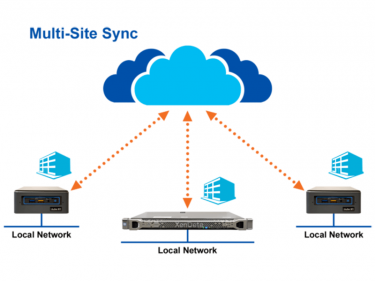| Українська | English | |||||||||||
|
|||||||||||
| News | About company | Service-centre | OB Van/SNG Rental | NextGen Energy Solutions | Contact us |
|
|
Engineering Service, Inc.
» News News XenData, the global provider of data storage solutions, announces its new Multi-Site Sync service for cloud object storage which creates a global file system accessible worldwide via XenData Cloud File Gateways. The XenData gateways are optimized for video files, supporting partial file restore and streaming, making the solution ideal for media applications.
Each gateway manages a local disk volume that caches frequently accessed files. The solution scales to 2 billion files, unlimited cloud storage and up to 256 TB of local disk cache at each location. It optimizes an organization's productivity by providing global file sharing across multiple facilities combined with excellent local performance provided by the local disk caching. Each instance of the synchronized gateway runs on a physical or virtual Windows machine and allows the global file system to be accessed on each local network as a standard share using SMB, NFS and FTP network protocols. When a file is written to the cloud object storage via one of the gateways, it immediately appears as a stub file within the global file system on all other gateways. The Multi-Site Sync solution currently supports the following cloud object storage services: Amazon Web Services S3, Hot and Cool tiers of Azure Blob Storage and Wasabi S3. Furthermore, it works with multiple cloud storage accounts, allowing simultaneous use of multiple cloud storage providers within the global file system. Each gateway uses multi-part HTTPS with checksum verification for fast, reliable and secure connection to the cloud storage. The gateways adhere to the Microsoft security model based on Active Directory, allowing easy installation into existing domains. The Cloud File Gateway software can be installed on Windows Server 2016, Windows Server 2019 and Windows 10 machines. XenData also offers two optimized edge appliances that include the XenData gateway software: the CX-10, a 1 RU rack-mount appliance with a 10 TB disk cache and the X1, a compact unit that includes a 1.92 TB SSD cache. Multi-Site Sync is scheduled to be available in May 2020. « To the list of news |
|
|||||||||||||||||
 |
+38 (044) 593-18-20 +38 (073) 593-18-20 +38 (096) 532-96-82 +38 (095) 532-96-82 Service center Telegram @Engineer_Service |

|
|
|||||
 |
e-mail: engineer-service.tv 15 Vavylovykh str., Kiev, 04060, Ukraine Authorized service centre of Panasonic, Sony, JVC, Fujinon, Canon |
|||||||







